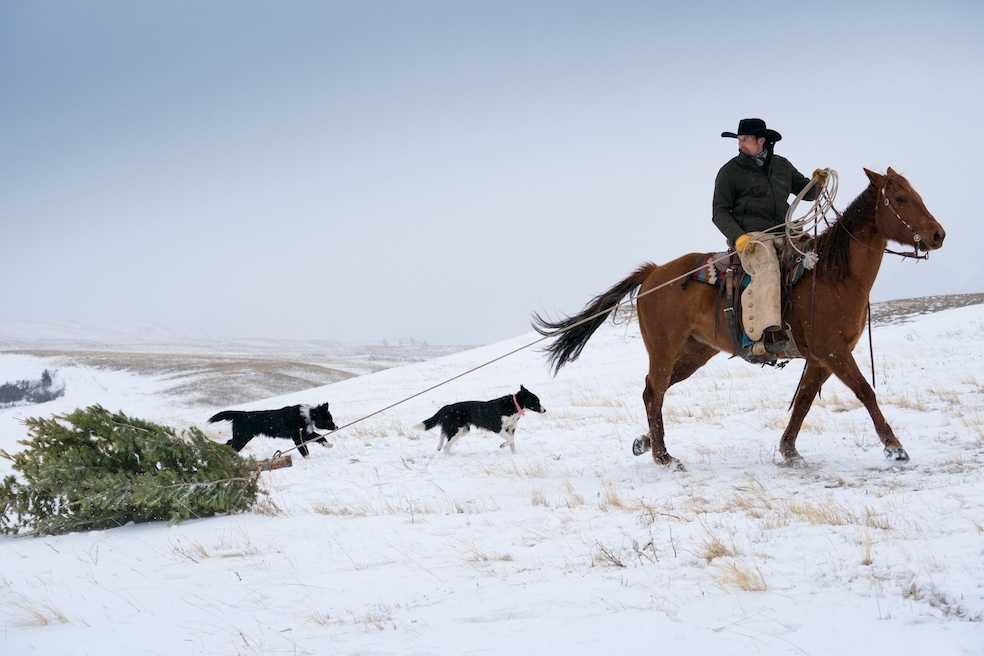A visit to a local Christmas tree farm is among the many traditions celebrated during the holiday season. There were more than 16,000 Christmas tree farms in the U.S. in 2022, with at least one in every state, according to the U.S. Department of Agriculture.
But did you ever wonder what it's like living on one?
"It's often magical throughout the year," said Leigh Nannini, who with her family owns Farmside Acres in Cornwall, New York. "Snowy days on the farm are actually as if you are living in a beautiful snow globe."
The biggest difference from living in a suburban home is that, like most farms, there is room to roam, said Phil Hartley, who owns Pinestead Tree Farms in Isanti, Minnesota. "I used to come home from work and just love to go out on [the] fields for an hour or two and just relax and unwind."
'Pure hilarity' and 'downright mischief'
"It can create an environment of pure hilarity and sometimes, downright mischief," Nannini said. "I always tell people my children are 'free range' — I’m never really sure where they are amongst the trees."
There are many games of hide-and-seek and ziplining through the trees, she said. Christmas tree clippings are occasionally used as lightsabers during down time, and Christmas tree carts become Nintendo Mario carts.
During the winter, tractors tow snow tubes and children compete to see who can survive longest, she said. Extra pieces of wood make excellent tree forts. At least one child gets baled in netting every year.
Hartley had no background as a farmer when he bought Pinestead in 1983. The owner was a neighbor, and the family came over to help at Christmas.
"We got hooked on the fun end of it and gradually got into the work end," he said. "The kids are so excited — they come with their families and they're so happy."
A lot of dirt gets tracked into the family home, which is next door to the farm, he said. Surprisingly, needles aren't that much of a problem.
Christmas tree sap is constant, said Nannini. "We have sap on our door handles, sneakers, steering wheels and even our dog's tail!" she said. "It’s sticky and hard to clean — but the oh-so-glorious smell makes it worth it." The distinct smell of the wood burning stove also permeates everything they own, she said.
Not all fun and games
The farm is only open two weekends a year, when it's all hands on deck, said Nannini.
"I tell my children this is the 'cost of living' on a tree farm — you have to earn your keep," she said.
Each child helps in a different way, she said. The family's young boys start with hand saws to cut the trees and graduate to gas-powered chainsaws when they are older and more responsible, she said.
One son unloaded a large number of Christmas trees before getting the bus to go to second grade. "His coat and hands were covered in tree sap!" she said.
When her youngest son was just learning to write numbers, his job was tagging all the trees in his five-year-old handwriting.
A winter storm dumped 3 feet of snow on the very first weekend he opened, Hartley said. People still came out and bought trees.
"You couldn't see any green — only snowy spikes," he said. "I had to dig a few feet down to the base to cut one."
Hartley's kids grew up working on the farm. His three boys and daughter helped plant seedlings in the spring. During the summer, they irrigated trees with a hose more than 1,200 feet long. "They were moving hose as much as watering trees," he said.
Hartley's son now runs the farm. His two daughters spend their summers mowing, Hartley said. Others come and help. "This weekend — Thanksgiving — they will all be here as well as all grandkids," he said. "They have gone to playing around to full-fledged workers. We have a huge meal, and it is just a lot of fun."
Would they do it all over again?
Absolutely, said Hartley. His children also grew up playing hide-and-seek on the farm and grew up to start working on it, he said. All joined 4-H, a national educational program for youths. One son got to take his tree exhibits to the state fair, he said.
"Of course, without a doubt I would!" said Nannini. Living on a tree farm has "immensely impacted" her kids' lives.
"From infancy to teenage years, they’ve been surrounded by the farmer mentality. Farming instills patience — you must wait for the growth around you. Nothing is overnight. You must have long-term planning skills — trees you plant today will not be ready for customers to cut for another decade."
A childhood on a tree farm isn't for everyone, she said.
"It’s not very traditional — the only neighbors are family, there are no 'streetlights' or sidewalks to get into town, but the acres of open space and the beauty of thousands of trees glistening in the snow offers a freedom and peace that, in my mind, a traditional neighborhood can’t offer."
"Whether it’s during peak season and snowfall is nothing short of fairytale-like, or summer when everything is abuzz with tree trimmers, shears, and mowers — it’s always a special place to come home to," she said.
